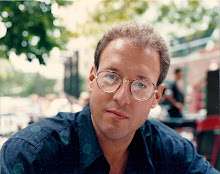 Everyone else is doing it. Asking questions that is - in focus groups, quantitative research, qualitative research, strategic planning and innovation. So why not ask questions? Because if you always do what you've always done, you'll always get what you've always got. Which is answers that do not substantively move your business forward. Answers that confirm the things that you already know. Answers that move you closer, like gravity, to the same strategies all of your competitors are using coverging on exactly the same positions, only saying the same things differently. No gain.
Everyone else is doing it. Asking questions that is - in focus groups, quantitative research, qualitative research, strategic planning and innovation. So why not ask questions? Because if you always do what you've always done, you'll always get what you've always got. Which is answers that do not substantively move your business forward. Answers that confirm the things that you already know. Answers that move you closer, like gravity, to the same strategies all of your competitors are using coverging on exactly the same positions, only saying the same things differently. No gain.So what do you do if you are Staples and the strategy that once made you all powerful now threatens to turn you into a commodity. Kodak, Starbucks can all ask the same thing. But the last thing they'd want to do is ask their customers questions. Sounds ridiculous right? Opps, that's a question.
You don't want to ask your customers questions because without additional positive mental stimulation, they will be unable to answer your questions from beyond their current traditional frame of reference and knowledge, They will only say what you and they already know. Further, you can't ask any questions you don't already know the answer to. It's kind of like a self-fulfilling prophecy. Why should Starbucks introduce $1 cups of coffee and who said that would impact their business? Are they doing it because there are now so many competitors Starbucks is becoming that commodity? So why respond with a dollar cup of coffee? It's not like going to Starbucks is out of the way, they're everywhere. They're not going to steal share and they're not going to stem trial of rivals products - so the move is an example of Starbucks running scared. I never heard of a Starbucks customer complaining about the price of a cup of coffee. Starbucks price is what made their product part of one of my aspirations. So now you're ripping the guts out of your brand by trading on price!? When you trade on price you go so low in terms of perception and brand equity (P&G learned with it's EDLP - everyday low price strategy) that you later have to climb up a ladder to get to the bottome or is that bottom? (I knew that)
And lastly, when you ask questions you don't get the voice of your customer, you get the voice of the inquirer through the question being asked - a form of bias that will lead you astray. So questions are dead you say? Yes! OK smarty pants - so why do attorneys ask questions and win cases with them? Because they are trying to prove a point in law, a static point, that already exists. It does not move. And to grow business you must. And why don't more people stop asking questions and start probing minds with proactive materials that stimulate activity to a higher level? Because they don't know how. They were bred from birth to ask questions. It's as easy as breathing - which is why everyone does it. Getting ahead without questions is much harder. It is the road less taken - which is why it wil take you farther than you need to go.
So don't ask questions. Look what happened to the joker.















